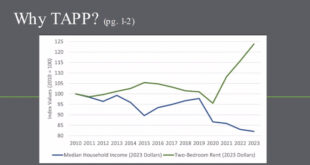Majority of RTA drivers living in Montrose and looking for overnight stays
By Mark Reaman
While considering whether to buy another Lazy K affordable housing unit, members of the Gunnison Valley Rural Transportation Authority (RTA) delved into a deeper discussion of the local affordable housing issue in the valley. While they ultimately decided to purchase the unit, they agreed to look into other ways to assist workers with housing.
RTA executive director Scott Truex asked the board to approve the purchase of a three-bedroom, two-bath unit with a garage that he indicated could be used in the future to house a director or administrative staff member. The purchase price was $425,000 and while it was originally offered to the general public, no one attempted to purchase the unit. That left it open for the RTA. The RTA already owns seven units in Lazy K, a condo in Crested Butte, and has its eye on some units in the upcoming Mineral Point affordable housing development in Crested Butte. Of the seven units in Lazy K, four are vacant.
“We are buying units in both Gunnison and Crested Butte to get ahead of the curve,” explained Truex. “Housing will just become harder in the future and we need to be able to house drivers, mechanics and other employees.”
“I am a little conflicted,” admitted RTA board member Liz Smith. “It’s disappointing no one from the general public was able to get that unit. On the one hand it is great that bigger employers in the valley like the RTA can step in and buy them but it’s not healthy in the long term for someone’s housing to be tied to their employment. I would be interested to look at the long-term impacts. I don’t know the answer.”
Board member Jason MacMillan said while he shared that concern, it was important to also sustain the RTA. “We are in a position to buy this outright so don’t need to pay interest through a mortgage,” he said. “I would support this one but be glad to pump the brakes on doing a lot more purchases at this time.”
“Maybe there are other ways we can support affordable housing other than buying and renting to employees,” said Smith. “Maybe we look at other avenues like providing down payment assistance. We need to be forward thinking in how we navigate affordable housing as an employer.”
Truex said he too has been pondering how to provide different housing alternatives, but he and his colleagues in the Colorado Association of Transit Agencies haven’t discovered any. He also said there might be an issue of helping new employees while not figuring out how to help workers who have been employed by the company for years.
“I am surprised we still have some vacant units,” said board member Boe Freeburn. He said he knows of two families that had to leave the valley recently because of lack of housing and it was frustrating to know there were two empty units but, given deed restrictions, they couldn’t be used to help families in immediate need.
Alpine Express runs the RTA bus operation and Alpine vice president Jon Galle said the issue is not simple. “Close to two-thirds of our workforce comes out of Montrose. We’re spending $100 or more a night with hotels for our drivers,” he said. “If we can figure out how to provide overnight housing for employees, that would actually be beneficial. Housing is very important to us. If we can work out how to have one or two of these units that charge by the night, that would be ideal.”
Truex noted that one of the Lazy K deed restriction stipulations is that the unit be the primary residence of whoever is living there.
Board member Anna Fenerty said she too was surprised the RTA units weren’t full.
“We obtained most of these last fall and it takes time,” said Truex. “Most locals that are here already have something. There are people that are relocating to the valley and moving in and that takes time. We also had some issue with the Housing Authority approving the tenants but that has been worked out so it should move faster from now on.”
The board voted unanimously to spend the $425,000 on the Lazy K unit.
“This is a good discussion, and I am not sure how to address all the concerns,” said Truex. “Everyone is certainly trying to figure it out. Not just here but across the state.”
Smith said she would call around to other counties to explore other workable solutions.
 The Crested Butte News Serving the Gunnison Valley since 1999
The Crested Butte News Serving the Gunnison Valley since 1999




